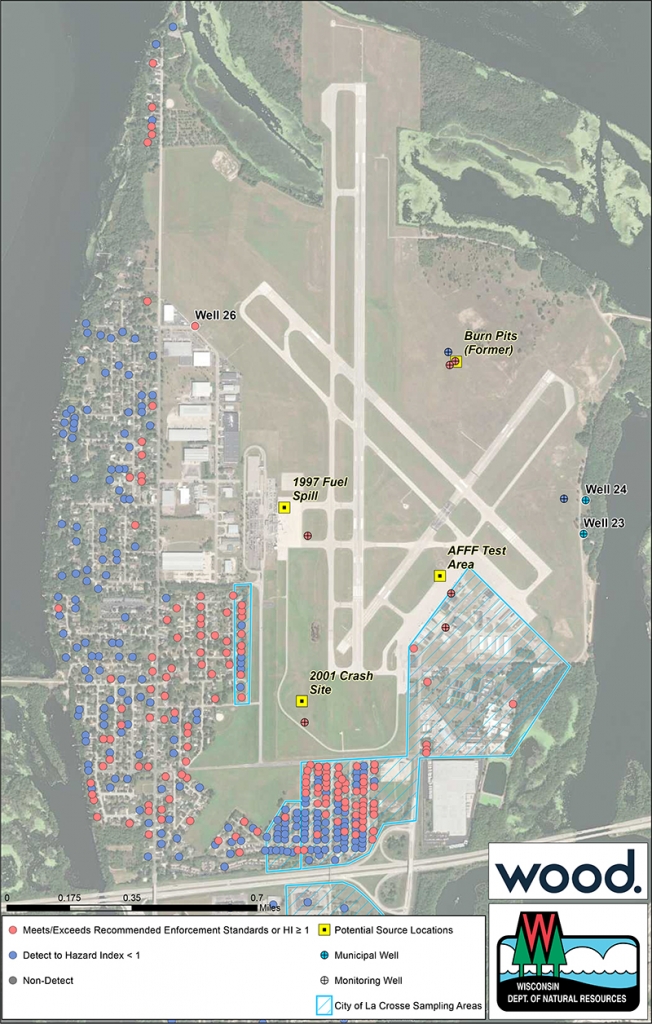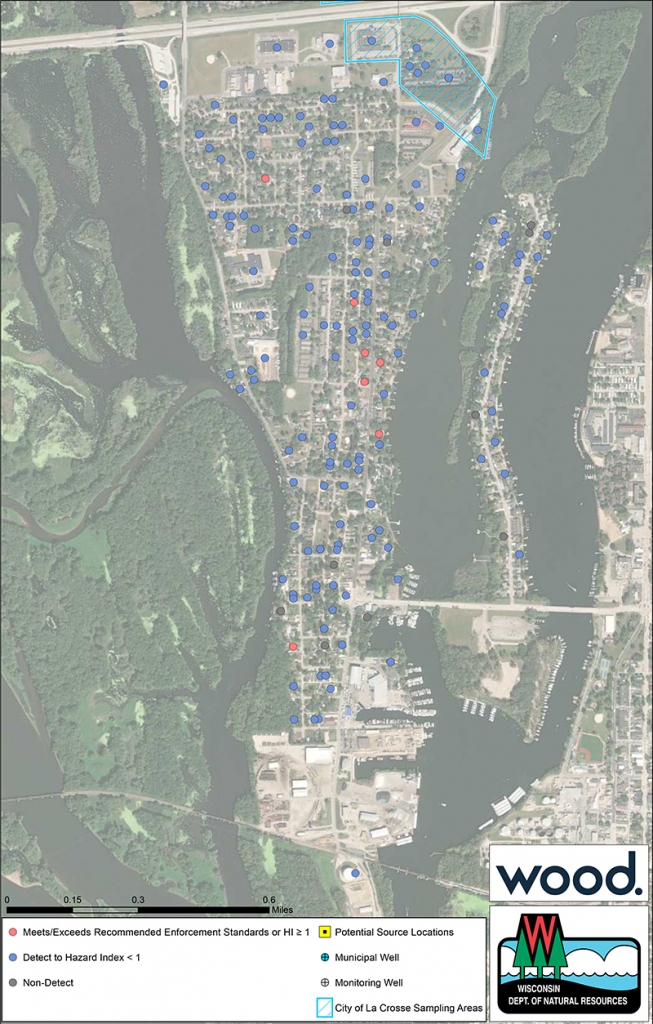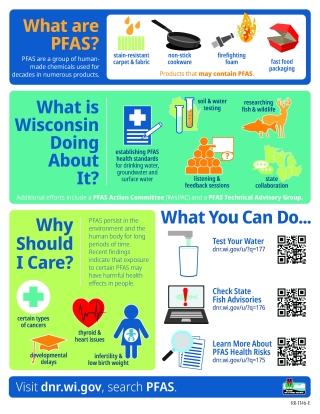PFAS Contamination in the Town of Campbell and French Island
PFAS contamination has been detected on French Island in the Town of Campbell in municipal wells, private drinking water and groundwater. In addition to the information on this website, the city of La Crosse has a website dedicated to providing information to the public.
SUBSCRIBE to updates about PFAS contamination in the Town of Campbell and French Island.
SUBMIT a question, comment or concern about PFAS in the Town of Campbell and French Island.
FIND a certified lab that can test drinking water for PFAS.
SEARCH a database for sites with reported PFAS contamination.
Public Meetings
Questions about PFAS contamination in the Town of Campbell and French Island may be submitted by email to DNRCampbellPFAS@wisconsin.gov or by calling 1-866-220-4841 (toll-free).
Information about upcoming meetings will be posted here when available.
Past Meetings
Public Meeting Date Time(s) Location Information Listening Session #3 Sept. 9, 2021 6-7:30 p.m. Remote via Zoom Listening Session #2 June 16, 2021 6-7:30 p.m. Remote via Zoom Listening Session #1 April 15, 2021 6-7:30 p.m. Remote via Zoom Community Information Session #1 March 25, 2021 6:30 p.m. Remote via YouTube Live Drinking Water Sampling
PFAS was detected in potable drinking water wells sampled by the city of La Crosse, private individuals and the DNR. In the two maps below:
- Red dots indicate sampling results above the hazard index or the enforcement standard.
- Blue dots indicate sampling results with some PFAS, but below the hazard index or enforcement standards.
- Gray dots indicate sampling results where no PFAS was detected.
This map shows drinking water sampling results north of I-90. The blue hatch-marked areas indicate the city of La Crosse private well study areas. This map shows drinking water sampling results south of I-90. The table below shows a summary of drinking water sample results received by the DNR as of June 21, 2021. Site information can be found on the Remediation and Redevelopment Program database (BRRTS on the Web), search BRRTS # 02-32-587311.
Drinking Water (Potable Wells) Number of Wells Sampled Number of Non-detects Number of Wells with Detects Exceeding DHS Recommended Groundwater Standards 1 Number of Wells Greater than DHS PFAS Hazard Index of 1.0 2 TOTALS 553 13 140 26 Private Wells Sampled by City of La Crosse 166 1 55 13 Private Well Data Submitted by Residents 167 1 61 4 Private Wells Sampled by the DNR 200 10 22 9 Public Wells Sampled by the DNR 20 1 2 0 1 The table references the recommended groundwater standards issued by the Wisconsin Department of Health Services (DHS) on June 21, 2019, known as "Cycle 10," and the recommended groundwater standards issued by DHS on November 6, 2020, known as "Cycle 11." Samples meeting or exceeding any of the recommended PFAS standards in cycle 10 or 11 will be included in this number.
2 The table references the recommended cumulative risk assessment method by DHS on November 17, 2020. Samples meeting or exceeding a PFAS Hazard Index of 1.0 will be included in this number. This means that no PFAS compound detected in a well attained or exceeded the DHS recommended standard, but the mixture of PFAS compounds detected would be such that the DHS and DNR would recommend another source of safe water for use.
Alternative Drinking Water

Reserve officer Taylor Rakes with the Town of Campbell Police and other town personnel, distribute bottled water to residents on March 25, 2021, at Olivet Lutheran Church on French Island. Read the La Crosse Tribune article. Photo Credit: Peter Thomson, La Crosse Tribune The City of La Crosse is supplying affected community members within the city's identified site investigation area with bottled water if PFAS concentrations in the samples were at or above state-recommended groundwater standards. Please visit the city's website for more information.
On March 25, 2021, the Wisconsin Department of Health Services (DHS) issued an interim area-wide drinking water advisory, allowing the DNR to provide temporary emergency water to residents with private wells on French Island who are not currently receiving water from the city of La Crosse.
On August 17, 2021, DHS informed DNR that the interim area-wide drinking water advisory should remain in effect based on available data. DHS and DNR will continue to review data as it accumulates and periodically assess the need for the interim area-wide PFAS health advisory revisions in the future.
Given this interim area-wide drinking water advisory, the state is taking the following steps to aid in providing safe drinking water to those residents with private drinking water supplies with known and suspected PFAS contamination.
1. Providing Bottled Water To Homes. For those residents with private water supplies, the Wisconsin Department of Natural Resources (DNR) will provide the option of bottled water to be delivered in five-gallon containers to those residents' homes. Residents need to sign up for this service through the DNR by filling out an agreement with the state to begin receiving water.
To request a temporary alternative water supply from the DNR, please fill out an Agreement for Requesting Temporary Emergency Water.
The Town of Campbell will make physical forms available at the town hall. The town will scan and email agreements to the DNR. The town hall can be accessed Monday, Wednesday and Thursday 8 a.m. - 4:30 p.m.; Tuesday 8 a.m. - 6 p.m.; and Friday 8 a.m. - 3 p.m.
Be sure to indicate on the agreement if you need a bottom-loading dispenser. Bottom-loading dispensers are generally provided to those who are unable to lift five-gallon jugs.
Residents who are currently paying for their own 5-gallon bottled-water service should also fill out and submit an agreement to have the DNR take over coordination and payment of their service. Please indicate on the form the name of the company with which you have an existing service.
Residents receiving bottled-water delivery service from DNR are reminded to exchange empty bottles for full bottles at their next delivery. Please do not discard or recycle your empty five-gallon containers.
Investigations
Under the oversight of the Wisconsin Department of Natural Resources (DNR), the city of La Crosse began conducting a site investigation for PFAS on French Island in the spring of 2019 based on PFAS detected in Municipal Well #23. In May 2019, the City of La Crosse was identified as the responsible party.
This investigation continues to evolve as additional work is performed. It is possible that more sites and responsible parties may be identified in the future, necessitating additional investigation. This page will be updated as new information becomes available. For more information on the city's investigation, see BRRTS 02-32-587347.
Responsible parties (RPs) that cause a discharge of a hazardous substance or environmental pollution are required to report, investigate and clean up contamination. RPs are required to immediately notify the state of a discharge of a hazardous substance regardless of whether the discharge is confined to the property where the contamination occurred or has migrated to another property. The DNR follows the process outlined in NR 700, Wis. Adm. Code, to inform the RP of their requirements, which includes a recommendation to hire a qualified consultant to investigate and remediate contamination in compliance with relevant laws. RPs may also be required to conduct immediate or interim actions, such as providing bottled water or water filtration systems.
Health Information and Resources
The Wisconsin Department of Health Services (DHS) is supporting the DNR in assessing human health risks associated with the PFAS contamination in the Town of Campbell on French Island, including recommendations to reduce those risks.
An interim area-wide health advisory can be issued by DHS for a specific area when the well test results we have may mean that a problem with well water exists in an area, but we don't have enough data at the time to know for sure exactly which specific wells are affected. As we obtain more data, the area included in the interim advisory can become larger or smaller or the advisory can be changed to include only specific wells where problems are known to exist.
For health-related questions, please email DHS at DHSEnvHealth@dhs.wisconsin.gov.
Learn more about the health effects of various PFAS on the following websites.
- DHS: Per- and Polyfluroalkyl Substances (PFAS)
- Agency for Toxic Substances and Disease Registry (ATSDR): PFAS and Your Health



